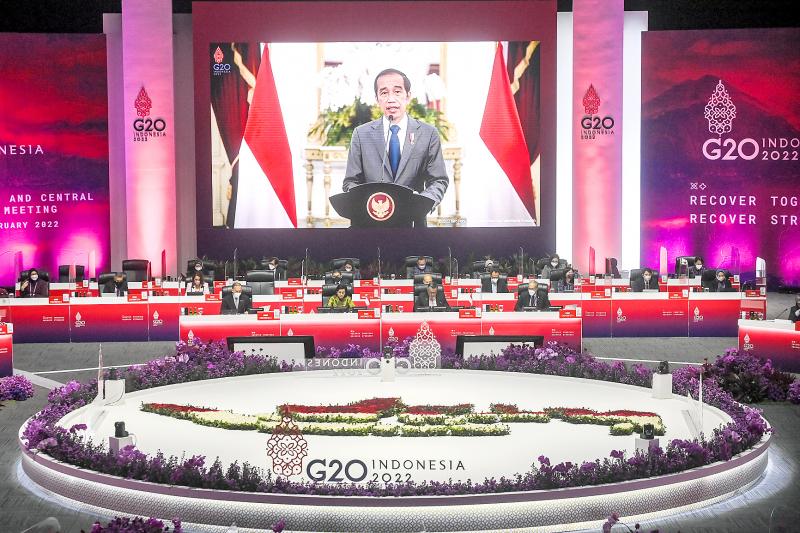Indonesian President Joko Widodo called for a de-escalation of tensions in Ukraine during a meeting of G20 finance ministers and central bank governors in Jakarta, warning that a conflict threatens security and would be disruptive to the world’s economic recovery from the COVID-19 pandemic.
“This is not the time for rivalry, nor is it the time to create new tensions that disrupt the world’s recovery, let alone endanger the safety of the world, as is happening in Ukraine today,” he said. “All parties must stop the rivalry and tension, we must focus on synergizing, collaborating to save and resurrect the world to quickly rise and recover.”
The remarks from the leader of Southeast Asia’s largest economy echoed concerns that an invasion of Ukraine would have far-reaching consequences.

Photo: EPA-EFE
Kiev’s Western allies say Russia has massed as many as 150,000 troops on its borders in a possible precursor to an attack and are voicing reservations about announcements from the Kremlin that it is withdrawing some forces.
“All countries are connected to each other, no one is isolated,” Widodo said. “The rise of one region will revive another region; the collapse of one region will also bring down other regions.”
Russia, which annexed Crimea from Ukraine in 2014 and supports separatists in Ukraine’s eastern Donbas region, has said it has no plans to invade.
Russian President Vladimir Putin has made clear that the order had been given only for a “partial” pullback and suggested that a full return to base would depend on how talks with the West go.
Australian Treasurer Josh Frydenberg said the situation was “deeply concerning” and it was in the collective interest that these tensions are resolved.
“We call upon Russia to de-escalate the situation for the alternative would be disastrous in human and economic terms,” he told the G20 conference.
The G20 consists of the EU and 19 countries with the biggest industrialized and emerging economies.
Washington, which last week released a strategy for the Indo-Pacific region as a means to counter China’s growing influence, is concerned Beijing would try to take advantage of the tensions between Russia and Ukraine.
“We stand for a world and a vision grounded in problem solving and innovation, not coercion and aggression,” US Assistant Secretary of State for East Asian and Pacific Affairs Daniel Kritenbrink said during a briefing yesterday.
“I think it stands in stark contrast to the vision of others, including that put forward by” Putin and Chinese President Xi Jinping (習近平), he added.

The US dollar was trading at NT$29.7 at 10am today on the Taipei Foreign Exchange, as the New Taiwan dollar gained NT$1.364 from the previous close last week. The NT dollar continued to rise today, after surging 3.07 percent on Friday. After opening at NT$30.91, the NT dollar gained more than NT$1 in just 15 minutes, briefly passing the NT$30 mark. Before the US Department of the Treasury's semi-annual currency report came out, expectations that the NT dollar would keep rising were already building. The NT dollar on Friday closed at NT$31.064, up by NT$0.953 — a 3.07 percent single-day gain. Today,

‘SHORT TERM’: The local currency would likely remain strong in the near term, driven by anticipated US trade pressure, capital inflows and expectations of a US Fed rate cut The US dollar is expected to fall below NT$30 in the near term, as traders anticipate increased pressure from Washington for Taiwan to allow the New Taiwan dollar to appreciate, Cathay United Bank (國泰世華銀行) chief economist Lin Chi-chao (林啟超) said. Following a sharp drop in the greenback against the NT dollar on Friday, Lin told the Central News Agency that the local currency is likely to remain strong in the short term, driven in part by market psychology surrounding anticipated US policy pressure. On Friday, the US dollar fell NT$0.953, or 3.07 percent, closing at NT$31.064 — its lowest level since Jan.

The New Taiwan dollar and Taiwanese stocks surged on signs that trade tensions between the world’s top two economies might start easing and as US tech earnings boosted the outlook of the nation’s semiconductor exports. The NT dollar strengthened as much as 3.8 percent versus the US dollar to 30.815, the biggest intraday gain since January 2011, closing at NT$31.064. The benchmark TAIEX jumped 2.73 percent to outperform the region’s equity gauges. Outlook for global trade improved after China said it is assessing possible trade talks with the US, providing a boost for the nation’s currency and shares. As the NT dollar

The Financial Supervisory Commission (FSC) yesterday met with some of the nation’s largest insurance companies as a skyrocketing New Taiwan dollar piles pressure on their hundreds of billions of dollars in US bond investments. The commission has asked some life insurance firms, among the biggest Asian holders of US debt, to discuss how the rapidly strengthening NT dollar has impacted their operations, people familiar with the matter said. The meeting took place as the NT dollar jumped as much as 5 percent yesterday, its biggest intraday gain in more than three decades. The local currency surged as exporters rushed to